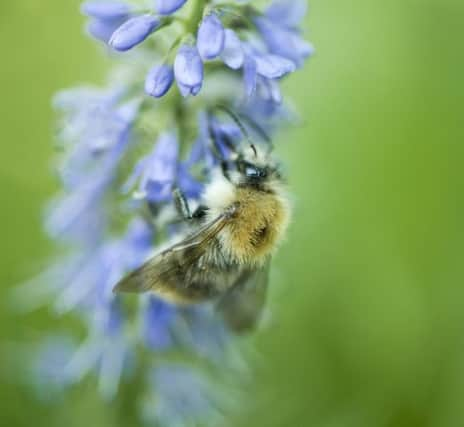Scots urged to help save '˜frugal' native honey bee


Native honey bees have been around since the end of the ice age and are specially adapted to thrive in Scotland’s harsh climate.
Research has shown they possess many beneficial traits, including mild temper, above-average activity levels at lower temperatures, good nectar-gathering and improved ability to survive Scottish winters.
Advertisement
Hide AdAdvertisement
Hide AdBut populations of the BEES have crashed in recent years due to cross-breeding with alien species and attacks by a deadly parasite.
Now experts fear the species is in danger of vanishing if urgent action is not taken.
The first phase of the initiative is to conduct a Scotland-wide survey, with beekeepers asked to send in photographs of any of their stocks they believe visually resemble the Scottish native dark bee.
All submissions will be examined by a team of experts and those showing the closest conformance to the characteristics of the species, Apis mellifera mellifera, will be put forward for DNA analysis to establish their genetic purity.
It’s hope pure-bred examples can then be used to establish new colonies with the widest possible gene pool.
The newly formed Scottish Native Honey Bee Society (SNHBS) is behind the scheme.
“Disease and hybridisation are putting the native honey bee in real trouble in our country,” said Ian Lennox, SNHBS project co-ordinator.
“We know, thanks to modern genetics and morphology, that small pockets of native honey bees do still cling on in some parts of Scotland. Having populated these lands for something like 8,000 years, these native dark bees deserve the chance to avoid extinction.”
Advertisement
Hide AdAdvertisement
Hide AdIronically, according to Mr Lennox, some of the problems facing the Scottish bee come from a renewed interest in bee-keeping as a hobby.
“It’s good to realise that there are so many new and enthusiastic beekeepers today, but many of the bees available to them are derived from imported stocks of non-native bees and when these cross with our native strain it begins to dilute the authenticity of the true Scottish strain,” he said.
“Scottish native honey bees are a brown bee with a reputation for frugality, which helps them withstand even the dreichest of Scottish weather.
“But, like the Scottish Wildcat, it has been getting increasingly difficult to find good pure examples, and if we don’t take action to reverse their decline we may see them disappear for ever.”